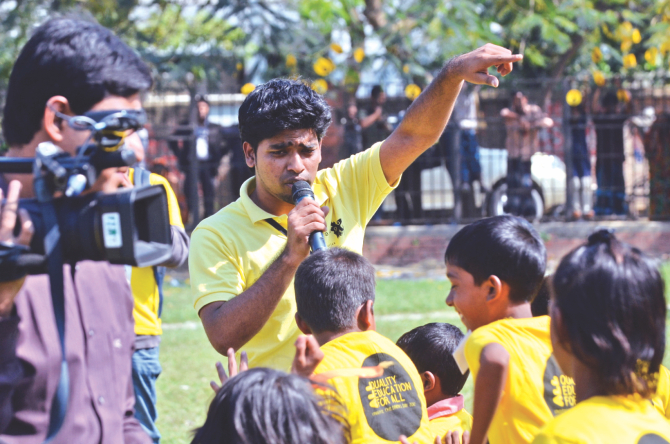Celebration of CHILDHOOD

For the last five years, JAAGO has been organising the celebration of the Universal Children's Day in Bangladesh, and each year the celebration has been on a bigger scale than the previous one. “This year, it is happening in 28 districts in Bangladesh,” says Korvi Rakshand, the founder of the organisation. “Our theme this year is Invest in Education and the reason is that we have received many donations in the past, but now we believe the government, the NGOs and the INGOs, the local organizations and corporate sector have to seriously start thinking about being more involved in the improvement of the education sector, and not just financially. The volunteers who will be on the streets tomorrow are trying to raise awareness as well as collect money,” he says.
This year JAAGO will be taking around 4000 street children from the 28 districts to various amusement parks, with ferris wheels and concerts organized for them so they get one day off the streets to enjoy their childhood. “In their place we will put over 10,000 volunteers from schools, universities and different corporate organizations, to collect money with flowers, brochures and stickers and inform people about this special day,” Rakshand tells us. “They will also remind people to be kind to their own children and the children working in their houses and do something special for them to celebrate the day.”
This year, their corporate partners are the US Embassy, Beximco, Renata, KFC and Pizza Hut. “We also have people like Anisul Haque, Akku Chowdhury from Transcom, Rubana Haque and Wasfiya Nasreen who come and spend some time with the children and support the cause,” he informs us.
Since JAAGO started celebrating UCD in 2009, and one progress they have seen is that the government has started celebrating childrens' week, “This we think is very important and significant to our cause,” says Rakshand. “Another change we have noticed is that often times, when the street children knock on our car windows we are annoyed at them and end up misbehaving with them without realising the effects it has on them,” he tells us. “When our volunteers are out on the streets they too face this at times and this feeling makes me have a soft corner for these children and they are driven to do more for them. Many of our volunteers have started their own small initiatives to help them,” he relates. “Also, we have to speak to the people these street children serve, the “godfathers” and request them to let them come to our celebration and in them too we have seen a positive change in attitude toward the children.”
In the JAAGO schools the dropout rate is currently 4.5 percent where the rate in the government schools is 33 percent. “This is due to the fact that we have supporting programmes such as counseling etc to ensure that the dropout rate is low,” Rakshand tells us. “Last year children from our school sat for a government exam in English and we had a 100 percent pass rate, and 51 percent received an A plus and one child whose father is a rickshaw puller, got full scores in all the subjects. In the future, we would love to see more corporate and government involvement in our endeavors.”


 For all latest news, follow The Daily Star's Google News channel.
For all latest news, follow The Daily Star's Google News channel. 



Comments